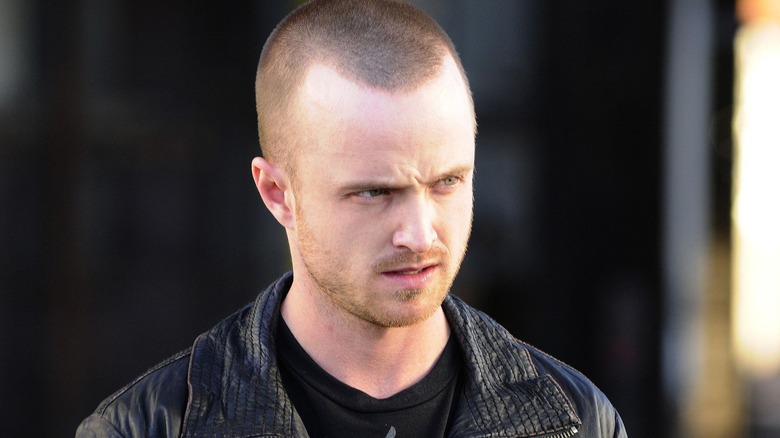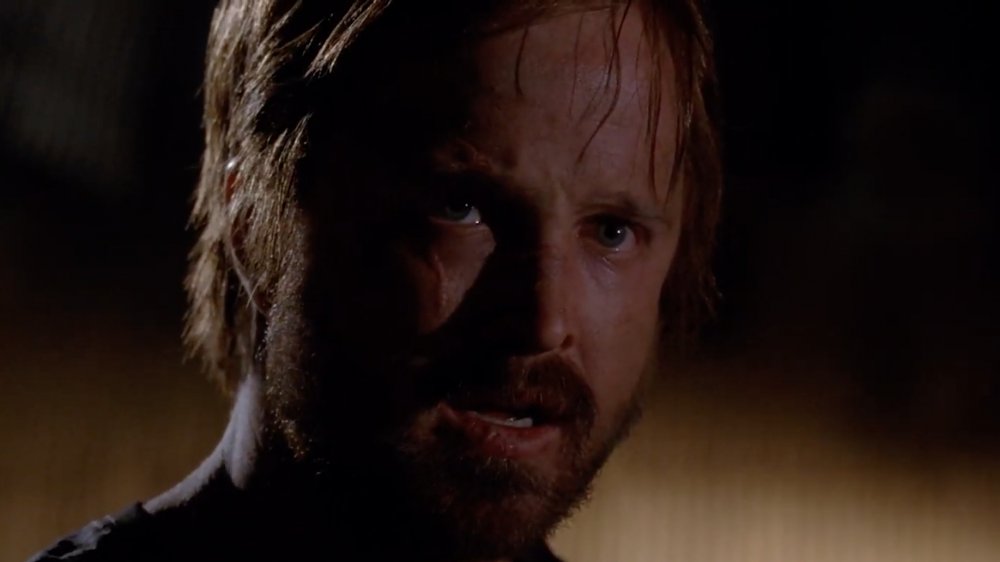The One Thing About Jesse That Breaking Bad Fans Can't Get Over
Breaking Bad finished its epic tale of meth, mania and mayhem way back in 2013. Heisenberg memes and the occasional tighty-whities reference aside, Breaking Bad has largely faded into the background buzz of cultural ephemera, reluctantly stepping aside for the next big thing.
But there's one pesky pebble in the shoe of how fans remember Breaking Bad: That damned ricin-poisoned cigarette. This storyline gets really complicated really fast, but here's the 101. Walter White crafts a deadly cigarette to kill one of the (many) big bad guys threatening their lives. That plan goes sideways, and the cigarette disappears. Flash forward several seasons. The young son of Jesse's ardent romantic interest, Andrea Cantillo, nearly dies ... you guessed it ... after ingesting some kind of poison. Nothing can be proven. Walter denies any involvement, but something just doesn't track. It's arguably this moment, of all the hard moments Jesse has to endure (including his love interest's eventual overdose) that haunts him. While he can prove nothing, a cocktail of guilt and suspicion guides his path from that moment onward. He can never shake the belief that Walter poisoned Brock to draw Jesse back into his chaotic orbit.
Uncharacteristic sloppiness?
Flash forward yet again (last time, promise) to the cataclysmic wind-up to this tale. Jesse has his one chance to escape. He's standing at the side of the road, waiting to be picked up and whisked away to a new life in a new town with a new name. Just minutes from escape, Jesse realizes his stash of pot was lifted from his pocket by one of the recurring henchmen who indirectly worked for Walter. In a blinding flash of realizations, Jesse now understands that Walter was behind the original stolen ricin cigarette. Which means he was right all along; Walter had indeed poisoned Brock to manipulate Jesse yet again. Walter had always lied, Jesse knew that by now. But this lie caused a domino effect that ultimately broke Jesse. In that moment, he chooses not to escape, instead taking a path that would ultimately lead him straight to Hell's front doormat.
If that little chain of events seems complicated and perhaps a little tenuous, you've successfully arrived at the nub of the controversy. In the space of five televisual seconds, Jesse connects half-concealed dots scattered across years of story-telling to arrive at one horrifically life-bending decision. How? And just as importantly, without the aid of extensive crib notes, how on earth can viewers be expected to understand this baffling decision? Is this not just a strange moment of bad story-telling in an otherwise sublimely detailed and unsettlingly relatable storyline? A ton of fans will say that's exactly what this was — a misguided attempt to pivot a plot on a cheap Deus Ex Machina turn of fate.
Or a brilliant insight into guilt and redemption?
But others argue we might actually be looking at one of the most brilliant — albeit crazy subtle — moments of the whole series. And it hinges on this. Jesse knew all along.
Breaking Bad explores a multitude of perspectives on what makes a "good" and a "bad" person, but one element viewers see time and again is how little decisions layer to become cataclysmic decisions. Walter White's choices are obvious ones — brutal, exacting, and fearless. But Jesse's continual passive decision to go along with Walter are the insipid flip side to the coin of causality. Jesse didn't directly kill Andrea or poison Brock, but he realizes that — for him at least — culpability doesn't work that way. He's guilty. Walter is guilty. Just moments from escaping, his ricin cigarette realization is the last straw. And Jesse takes a different path, actively choosing to go against Walter's master plan. And the worst thing? While the decision may have been a personal turning point where Jesse finally takes control of his own destiny, it also led to what may well have been a fate worse than death — a kind of purgatory if you will — where Jesse is tortured and enslaved for months by a Mexican drug cartel. Perhaps the most appealing dimension of this theory is that, in this scenario, Jesse isn't realizing new information. Instead, he's realizing something profound about himself.
Who knows. Perhaps this was sloppy story-telling. Or ... just maybe ... viewers were getting a brutal but insightful glimpse into how an agonized human processes guilt and begins a new painful road to redemption.


